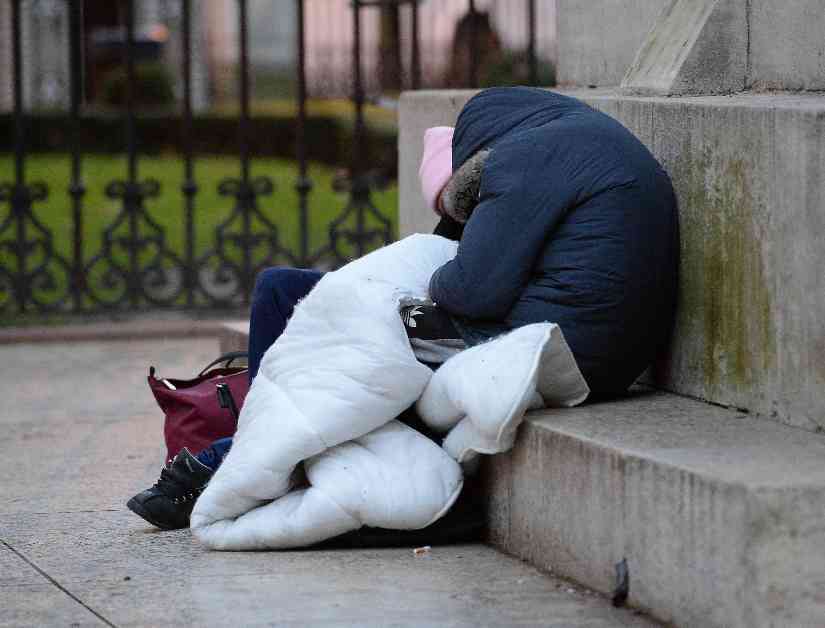Scotland Faces Humanitarian Crisis: 97 People Left Destitute by Hostile UK Immigration Policies
Thousands of individuals in Scotland are facing extreme poverty and homelessness as a direct result of the UK’s hostile immigration policies, a recent report has revealed. Conducted by Heriot-Watt University and funded by the Joseph Rowntree Foundation, the study focused on individuals with No Recourse to Public Funds, a category that includes those under immigration control or with restricted eligibility for state support.
Impact on Vulnerable Groups
The individuals affected by these policies encompass a diverse range, including asylum seekers, individuals on spousal or student visas, and European Economic Area nationals who are now unable to access housing and welfare benefits post-Brexit, despite having resided and worked in the UK for extended periods.
The report’s findings paint a bleak picture, with 97% of those surveyed classified as destitute, surviving on an average weekly income of just £40. Shockingly, a third reported having no income whatsoever in the past month, while two-thirds admitted to having gone without essentials such as meals, clothes, and toiletries during the same period.
Challenges Faced
Homelessness rates among this group were staggering, with 93% experiencing homelessness, including 53% who had slept rough in the past year and 55% who had resorted to temporary accommodation. The majority of individuals were not permitted to work, further exacerbating their dire circumstances. Even among the small percentage granted permission to work, challenges such as health issues, homelessness, and language barriers hindered their ability to secure stable employment.
Personal Stories
The report highlighted the stories of individuals like Sofija, a European national who has resided in Scotland for nine years and recounted her experiences of street homelessness and the constant struggle to find shelter. Another individual, Jamal, has been in the UK for 17 years seeking asylum and expressed the devastating impact of being unable to work and support his family, leading to strains on relationships and emotional well-being.
Call for Urgent Action
In response to the crisis outlined in the report, urgent recommendations have been proposed to prevent the situation from deteriorating further. The UK Government is urged to streamline pathways to settlement, ensure fair and swift processing of all claims, and empower local, regional, and devolved governments to provide immediate basic support to those in need.
Similarly, the Scottish Government is called upon to leverage its devolved powers to address the issue, committing resources to fulfill its vision of ending homelessness and destitution within Scotland. Professor Beth Watts-Cobbe from Heriot-Watt University emphasized the critical need for systemic reforms to prioritize access to essential resources and dignified living conditions for all individuals affected by these policies.
Collaborative Efforts
Deborah Hay, Senior Policy Advisor at the Joseph Rowntree Foundation, emphasized the importance of scaling up initiatives like Fair Way Scotland to meet the escalating demand for support. While such programs have proven transformative for those able to benefit from them, the current level of need far surpasses the available resources, necessitating increased collaboration and investment from various stakeholders.
Equalities Minister Kaukab Stewart reaffirmed the Scottish Government’s commitment to advocating for change at the UK level and providing support within its devolved powers to protect vulnerable communities. Stressing the importance of upholding values of inclusivity and support for all individuals, regardless of their immigration status, Stewart highlighted ongoing efforts to influence the UK Government’s immigration policies to better align with Scotland’s unique economic and demographic needs.
Conclusion
The harrowing realities faced by individuals affected by the UK’s hostile immigration policies demand urgent attention and decisive action. As Scotland grapples with a humanitarian crisis unfolding within its borders, it is imperative that both national and local authorities work collaboratively to implement solutions that prioritize the well-being and dignity of all individuals, irrespective of their immigration status. By heeding the calls for reform and investing in comprehensive support systems, we can strive towards a society that truly embodies principles of compassion, solidarity, and justice for all.
































